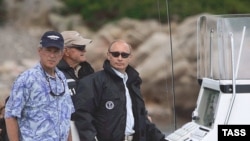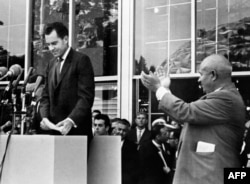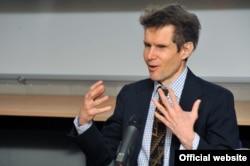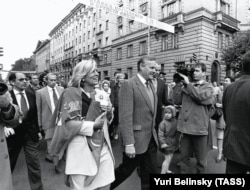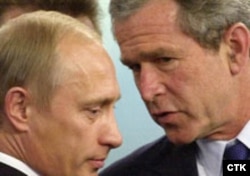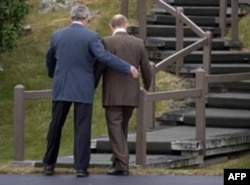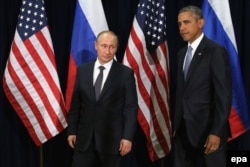In an op-ed published on the English language website of the Russian state-owned outlet RT.com, John Wight, a regular RT contributor, argued that visiting the United States might give Russian leader Vladimir Putin the ability to “humanize it beyond the realm of geopolitical differences.”
Wight drew a historical parallel with the 1962 Cuban Missile Crisis, when U.S. President John F. Kennedy and Soviet leader Nikita Khrushchev were able to reach an agreement that ended what often has been described as the most dangerous confrontation between the two superpowers during the Cold War.
“Indeed it is arguable that without his prolonged visit to the U.S. in 1959, Khrushchev may not have been so willing to accommodate JFK (the late-President John F. Kennedy) during the Cuban Missile Crisis three years later in 1962…” Wight said.
Mark Kramer, the director of the Russian and Eurasian program of Cold War Studies at Harvard University, called this assertion “nonsense.”
“The meeting Khrushchev had with Kennedy in Vienna in May 1961 left him with contempt for the U.S. president,” Kramer told Polygraph.info. “The notion that the meetings with [U.S. President Dwight D.] Eisenhower and others in October 1959 were the crucial factor in shaping Khrushchev's behavior three years later is preposterous. What shaped Khrushchev's behavior in October 1962 was the sudden realization that a large-scale nuclear exchange was a distinct possibility, the same realization that shaped Kennedy's behavior in making important concessions to Khrushchev to resolve the crisis.”
Wight’s conclusion merits a fact check since a distinct comparison can be made:
If it were true that Khrushchev’s single visit to the United States helped resolve the missile crisis, then Vladimir Putin has at least nine times the reason to “humanize” the U.S. Public records show he visited the U.S. twice before becoming Russia’s president, and seven times during his three previous terms in the Kremlin. Some of his U.S. trips involved experience in American life well beyond the usual diplomatic rituals and government settings – debunking Wight’s claim that Putin lacks a “humanizing” experience of the U.S
Before the presidency
In a March 5, 2000 interview with British journalist David Frost, Putin said he had visited the United States before becoming Russia’s president. “I have twice been to the United States on very short visits, on business,” Putin said.
Anatoly Sobchak was mayor of St. Petersburg in the early 1990s, and Putin served as his deputy. Sobchak died suddenly while on a campaign trip supporting Putin’s first presidential bid in 2000, and there were rumors he was poisoned.
September 2000 – New York City
Putin’s first official visit to the U.S. as Russian president took place five months after the Frost interview. He participated in the United Nations Millennium Summit in New York City and met with the outgoing U.S. President Bill Clinton.
Putin’s “Millennial” visit to New York City made headlines in mainstream U.S. media mostly because of his infamous response to the CNN’s Larry King question about the Russian navy submarine Kursk that sank in the Barents Sea in August 2000, killing all 118 men aboard. The tragedy captured the world’s attention, and the Russian government and Putin personally were accused of insufficient rescue efforts. When King asked the Russian leader,“ What happened with the submarine?” Putin smiled and said: “It sank.”
November 2001 – Washington, DC; Houston and Crawford, Texas; Ground Zero, NYC
Putin spent November 12-15, 2001, in the company of newly-elected U.S. President George W. Bush. Putin visited the White House, and a report on the visit, along with the eight photographs of the two leaders, is available in the archives of the White House website.
"This is a new day in the long history of Russian-American relations, a day of progress and a day of hope," President Bush said during a joint press conference with Putin at the White House on November 13. The two presidents traveled to President Bush's ranch in Crawford, Texas.
"He'll also get a taste of rural life here in Texas," Bush said of the Russian leader's visit. "He'll get to see Houston, and he's also going to get to come to Crawford." Putin and Bush visited Crawford High School and spoke to students there, the New York Times noting they “were clearly more at ease with each other than Mr. Bush's father ever was with Mikhail S. Gorbachev.”
September 2003 – Camp David, MD
Putin was a guest of the U.S. president at the Camp David residence during the weekend of September 26-27, 2003. The meeting reportedly did not produce the results George W. Bush hoped for – Russia’s commitment to aid U.S. forces in Iraq or a pledge to end Russian assistance to Iran’s nuclear program.
“While the two leaders underscored what they termed a close diplomatic and personal relationship, the meeting at Camp David nevertheless pointed up sharp differences between the nations and Bush's ongoing difficulty in rallying world support behind U.S. efforts in Iraq,” the Chicago Tribune reported at the time.
June 2004 – G-8 Summit, Sea Island, Georgia
By the beginning of Vladimir Putin’s second official presidential term in March 2004, even the most optimistic Russia watchers have already started questioning Moscow’s commitment to democratic changes, often pointing out Putin’s “autocratic tendencies.”
Then-U.S. Secretary of State Colin Powell described Putin’s rule in Russia as “not fully tethered to the law” and Christopher Cox, a U.S. Representative from California and the chairman of the Homeland Security Committee wrote in an Op-Ed in the Wall Street Journal, that “[M]ore than a decade after the collapse of the Soviet Empire, and six years after G-8 admission, Russia has failed to complete a successful transition from communism to free enterprise, and from a Soviet police state to a stable, securely democratic society.”
September 2005 and June-July 2007 – New York City and Kennebunkport, Maine
George W. Bush and Vladimir Putin had two more meetings on the U.S. soil before the end of Bush’s second term in the White House.
On September 15, 2005, the Russian president addressed the UN General Assembly, and visited the White House in Washington, DC on September 16.
During the Q and A at the joint press conference one reporter asked, “The Russian-U.S. relationship largely is based on your good personal relations. In year 2008, you both will cease to be Presidents. So have you laid any guarantees so that U.S.-Russia relationship could go on not worse than it does right now?”
“Are they already firing us? We still want to work,” Putin responded laughing.
On June 30, 2006 Vladimir Putin – the sole world leader to receive such invitation – stayed overnight at the Bush family Kennebunkport summer home on the coast of Main.
September 2015 – New York City
Vladimir Putin, in his third term as Russia’s President and now his government with a history of journalist killings, repression of the media and civil libertarians, mass protests in Russia against his rule and with ongoing involvement in at least three conflicts, namely Georgia, Ukraine and Syria, spoke to the United Nations General Assembly on September 28, 2015. Putin was portrayed in the Western press as “facilitating the continued menace of the Islamic State” by “propping up Assad’s government” in Syria.
Putin’s first formal meeting with the U.S. President Barack Obama was portrayed by journalists and experts as “quite awkward” or “comically awkward.”
“Putin has been to the United States numerous times and has met with U.S. leaders elsewhere many other times. None of this has made him warm up to the United States, a country he deeply resents and wants to undermine,” Kramer told Polygraph.info.
Finally, Putin does not need a special invitation to come to the United States – as Russia’s leader he has a standing invitation to participate in the United Nations annual General Assembly sessions, like the one that opens September 17 in New York City, to run until October 5. Putin skipped three previous GA sessions since 2015 and was represented instead by Russian Foreign Minister Sergey Lavrov.




